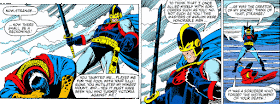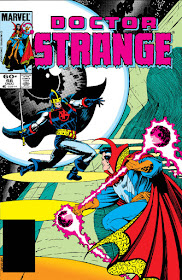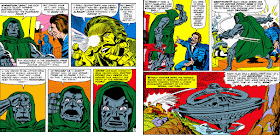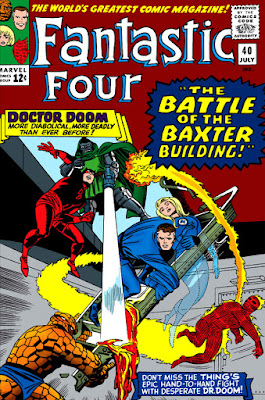Previously, we've seen Namor, the Sub-Mariner, refer to a prophecy handed down to him personally from Neptune, which held great promise for both Namor and his kingdom. When Namor succeeds in
restoring his people from the near-death state they succumbed to following their exposure to nerve gas which had escaped from a surface vessel, it's his belief that all that has happened has been in accordance with Neptune's prophecy, and he relies on that belief to revitalize the spirit of the masses and essentially declare a new era for his people.
But
has this prophecy been fulfilled, as he declares? To gain some much-needed perspective on the subject, it's helpful to take a look at the "Tales Of Atlantis" segment of
Sub-Mariner which illustrated the ancient history of the city, where the prophecy of Neptune had its roots in a vision experienced by the young leader who oversaw the reconstruction of a new Atlantis 5,000 years following the cataclysm which sent the original island continent into the sea. Only on this occasion, it wasn't Neptune, but the spirits of the King and Queen of the surface Atlantis, Kamuu and Zartra, who appeared to Kamuu's namesake and wove a tale of what was to come.
From what we see in the story, the legacy that King Kamuu speaks of wasn't as glorious as he and Zartra make it out to be. At the time of its destruction, Atlantis was on the losing side of a war with Lemuria, which a continent--an
empire--of such reputed stature doesn't reach the point of without neglecting flaws in its societal makeup that had likely been building for some time. Indeed, Kamuu and Zartra were both haughty and dismissive leaders during our brief look at their reign--and while the Lemurians may not have been shining examples of civilized man themselves, they obviously were able to take advantage of weaknesses of the Atlantean monarchy to bring them so close to toppling it. Further, it was Kamuu's own gambit to stop a group of Lemurians from breaching the city's massive dome (by drawing up magma from beneath the surface and releasing it over the dome, disregarding the consequences) which was responsible for the destruction which followed
*. It was the definition of recklessness and irresponsibility, fueled by only the desire to make a brutal example of any who presumed to attack Atlantis.
*Very much at odds with the city's destruction as depicted in the late-1988 Saga of the Sub-Mariner series.
Regardless, we can take away three key predictions from this vision: One, that the destiny of Atlantis is to rule the entirety of Earth's oceans; two, that Atlantis and its people will be witness to and survive the city's destruction a number of times throughout its existence; and three, that Namor could possibly bring Atlantis to the point where it would preside over the destiny of the entire human race. The first indicates that Atlantis will eventually unite other undersea kingdoms under its banner; the second hints that its rise to grandeur will be a rocky one fraught with conflict and/or disaster. And the third?
The prediction of its rise over all other nations of Earth is really the only part of Kamuu's prophecy which ties in with Neptune's, as Namor seeks the god's counsel after the disaster which befell the city following its (and his own) exposure to the nerve gas. Namor has a bold vision of his own--one that, as it happens, coincides with the words of Neptune:
The encounter stands as confirmation of the part of the prophecy which states that whether Atlantis fulfills its destiny to rise to the forefront--the vanguard--of all nations will depend on the actions and decisions of Namor, while Neptune has also echoed Namor's impassioned wish that he act to preserve the planet itself from man's reckless treatment of it. (Hear, hear.)
With the
Sub-Mariner title left by the wayside, both of these prophecies have been given little to no attention in succeeding stories by other writers in other titles, though in the '80s Roger Stern picks it up once more with a brief reference when Namor is captured as part of Zeus's
vendetta against the Avengers:
But it also bears noting that it's Namor himself who has often proven to be the weak link in fulfilling a prophecy that specifically names him as its linchpin. In the recent address he gives to his people following their resurrection, Namor appears to believe the prophecy has been fulfilled, though in reality he's merely cherry-picked the words which Neptune spoke to him--focusing on Atlantis rising from its near-destruction while ignoring the other aspects ot the prophecy which have yet to come to pass. He has yet to even begin the work which will see to the fulfillment of his destiny, or that of his people; in fact, consider
how he reacted not long after the disaster, when he fled to the surface and all but abandoned his people. It's behavior he's exhibited before, either on
his own initiative or due to his own neglect:
All disturbing portents of both his resolve as well as his ability to go the distance as the one responsible for the grand destiny envisioned for Atlantis.



















































